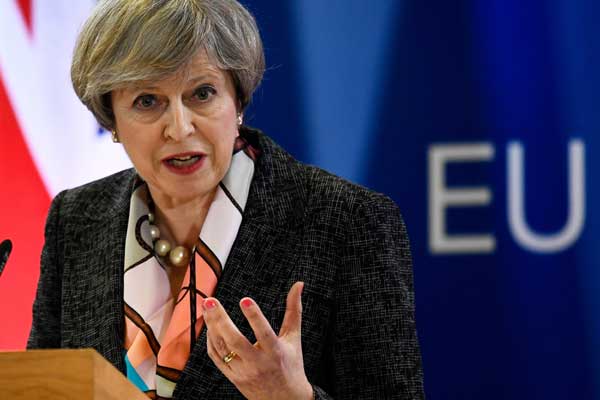
LONDON/EDINBURGH – British Prime Minister Theresa May told the Scottish government on Thursday “now is not the time” for a second independence referendum, saying it would be unfair to ask people to vote without knowing the result of Brexit talks.
While May fell short of saying her government would block a second independence referendum, her Scottish minister David Mundell was more forthright. He ruled out any discussion on the procedure to launch a vote now and immediately raised hackles north of the English border.
Scottish nationalists have called for a new referendum and accuse May of all but ignoring their demands in her preparations for divorce talks with the European Union.
Scotland voted to remain in the EU last June and Scottish First Minister Nicola Sturgeon said after May spoke that blocking an independence referendum would be undemocratic.
The remarks upped the ante in a war of words over Scottish independence as Britain prepares for intense EU exit talks.
“Right now we should be working together, not pulling apart,” May told British television.
“We should be working together to get that right deal for Scotland, that right deal for the UK. That’s my job as prime minister and so for that reason I say to the SNP (Scottish National Party) now is not the time.”
Mundell said there would be no negotiations on Section 30, a procedure that allows the Scottish parliament to legislate for an independence referendum.
“We will not be entering into discussions or negotiations about a Section 30 agreement, and any request at this time will be declined,” Mundell told a news conference.
He declined to clarify if or when a vote could take place.
Sturgeon hit back, accusing May’s government of being frightened of listening to the Scots.
“Any bid by the UK Government to block the people of Scotland from making a choice will be untenable, undemocratic and totally unsustainable – and clearly shows that the UK Government recognises it is out of step with the Scottish people,” she said in a statement.
“It would be outrageous for the Scottish Parliament to be frozen out of the process.”
NO GUARANTEES
Sturgeon said Scotland should have the chance to stay in the EU’s lucrative single market and keep an open-door policy to immigrants after voting to remain, and has criticised May for failing to consult the Scottish government on her strategy.
The Scottish Greens, another pro-independence party, said May risked boosting support for independence if she wanted to veto a decision expected to be made by Scotland’s devolved parliament next week.
Sturgeon is by no means guaranteed of winning a referendum just 2-1/2 years after Scots voted to keep the union, but she has managed to put pressure on May just days before Britain is expected to trigger Article 50 of the EU’s Lisbon Treaty and start the formal divorce procedure.
May is a unionist and will fight hard to keep Britain together but her government will be stretched in trying to negotiate a “good deal” with the EU and keeping vocal eurosceptics in her ruling Conservatives onboard.
Britain’s vote to leave the bloc last June deepened geographical and social divisions in the country, with Scotland and Northern Ireland voting to stay in the bloc while England and Wales backed an exit.
May says her government is committed to engaging with the whole of Britain over Brexit to negotiate a good deal for everyone, suggesting there should be no independence referendum until after a final deal is reach with the EU.
“To look at this issue at this time would be unfair because people wouldn’t have the necessary information to make such a crucial decision,” May said.


